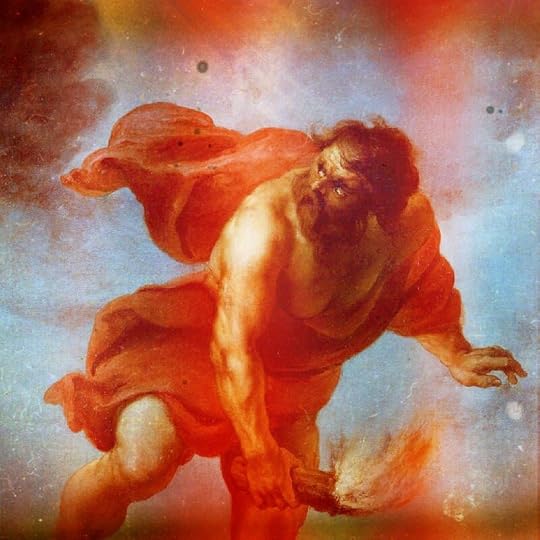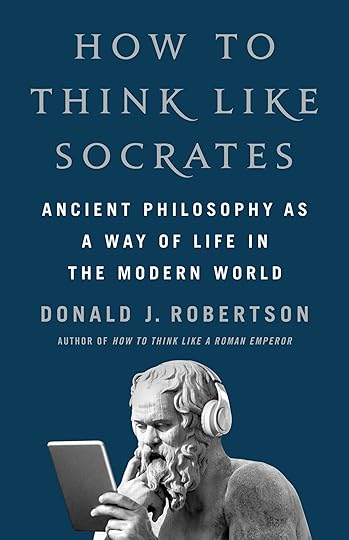The “Great Speech” of Protagoras
Towards that for the sake of which each being has been constituted and for which it was made, towards that it strives; now in what it strives towards, there resides its end; and where its end lies, there also lies its specific advantage and good. It follows that the good of a rational being must be fellowship with others; for it has long been proved that we were born for fellowship. — Marcus Aurelius, Meditations, 5.16
This is an excerpt from my book How to Think Like Socrates, published by St. Martin’s Press, available in audiobook, ebook, and hardback.
Protagoras smiled for a moment. His followers were unsure what to make of this oddball Socrates, and a few had taken offense. Protagoras seemed to look upon him with a mixture of frustration and admiration. “I would welcome the opportunity to explain my views to you,” he said in a voice so charming, that the whole audience seemed to fall back under its spell. “Rather than developing an argument, though, I think it would be most pleasing, if I simply told you a story.” Socrates was about to object, but everyone else agreed. So the famous Sophist, the wisest man alive, proceeded to give one of the most remarkable speeches in the history of philosophy, known to us simply as The Great Speech of Protagoras.
Stoicism: Philosophy as a Way of Life is a reader-supported publication. To receive new posts and support my work, consider becoming a free or paid subscriber.
The SpeechThere were gods, in the beginning, he said, but no mortal creatures. When the time came, Zeus, the king of the gods, fashioned countless species of animals by mixing together the elements of earth and fire. He then commanded two of the titans, Prometheus and his brother Epimetheus, whose names mean Foresight and Hindsight, to assign different abilities to each living creature.
Hindsight begged for the right to assign the abilities all by himself. Foresight agreed, and said that he would inspect his brother’s work when it was done. Some creatures were slow moving and so to make up for this, Hindsight gave them great strength. Others were weak, so to these he granted speed. Some creatures he armed while others were given various forms of protection. Small creatures were granted winged flight or the ability to conceal their dwellings underground for safety. Large beasts had their size for protection. Care was taken to grant all creatures some means for their own preservation so that no species should be in danger of extinction.
Having equipped all living beings to survive among each other in this way, without fearing that one species should eliminate another, the titan next granted them protection against their environment and the harshness of the seasons. He covered some animals with skin tough enough to endure the heat of summer and others with thick pelts, to ward off the cold through winter months. Some he shod with strong hooves and others with padded feet for the rough earth. Every creature was assigned its own source of food. Some pastured on the earth, others ate fruits hanging from trees or dug up roots from the ground. Still others were hunters who fed upon the weaker animals. To these predatory creatures he assigned limited offspring whereas their prey were more abundant so that there would always be enough to serve as food.
Hindsight lacked wisdom, however, and having assigned to each species its own special capabilities, he realized that he had nothing left to give the human race. When Foresight inspected his brother’s work, he found that man alone was born naked, and had been left unshod, unarmed, and with no bed in which to lay his head and rest safely. Not knowing what else to do, he stole the technical expertise of the goddess Athena and gave it to mankind, along with the fire of Hephaestus, the blacksmith god. Together, these gifts allowed mankind to survive in the wild, though they were as yet unable to found cities.

Once human beings were granted these divine gifts, they sensed their kinship to the gods and began praying and building altars to them. They invented clothing, bedding, dwellings, agriculture, and even the use of language to express their thoughts and acquire learning. Men lived apart at first, in scattered isolation, but finding themselves beset continually and harassed by wild beasts they sought to build cities for their mutual protection.
However, the wisdom that governs our relations with other humans, the art of politics, belonged to Zeus alone, king of the gods and patron of friendship and families. No sooner had humans gathered together to save themselves, being as yet lawless, they began to wrong one another and fighting broke out among them. Without the art of war, which is part of politics, they did not know how to conquer their enemies, build alliances, or secure peace. Scattering once again from their failed cities, they continued to perish in the wild.
Looking down upon this chaotic scene with dismay, Zeus feared for the destruction of the human race. He therefore sent Hermes, the messenger of the gods, to teach mortals about justice and to instill in them a sense of shame concerning wrongdoing, as a deterrent against injustice. By this means Zeus now granted mankind the capacity to unite themselves in cities, maintaining order through the bonds of friendship and fostering their sense of community.

Hermes asked Zeus whether he should distribute the virtue of justice, and other social and political arts, among men in the same way as knowledge concerning the technical crafts. One man who possesses the knowledge of medicine, he said, was enough to benefit many men, and so on. However, Zeus decreed that each and every human being must be granted at least some knowledge of justice and a sense of shame with regard to their own wrongdoing. Finally, he set it down that any criminal who was found unable to respect the rule of law should be exiled or put to death, being a plague on the city.
With this, Protagoras concluded his story, and the audience broke into applause, led by Alcibiades. Their hearts swelled because the great speech seemed to glorify the democratic ideals of Athens by means of its allegory. Pericles, like Zeus in the story, had said that the welfare of the city depended on the ability of every Athenian citizen to have his say regarding matters of justice, whether sitting in the courts or participating in the Assembly, a right granted to them by his ancestors.
Thanks for reading Stoicism: Philosophy as a Way of Life! This post is public so feel free to share it.



